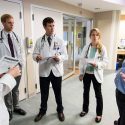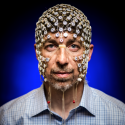UW-Madison to legislators: Don’t ban important fetal tissue research
Proposed legislation in Wisconsin will have a devastating impact on the ability of researchers to create lifesaving treatments for patients, Robert Golden, dean of the University of Wisconsin–Madison School of Medicine and Public Health, told members of a Wisconsin Senate committee in a public hearing Tuesday, Sept. 22.
“This is not just the opinion of John (John Raymond, president and CEO of the Medical College of Wisconsin) and myself,” Golden said as part of his testimony with Raymond in opposition to Senate Bill 260. “It is the opinion of the nation.”
Golden read a letter drafted by the Association of American Medical Colleges, signed by a growing number of top biomedical research institutions and health systems across the country — including Harvard, Yale and Johns Hopkins — opposing the legislation, which would restrict research using fetal tissue, cells and cell lines.
The Senate bill, and its corollary in the Wisconsin Assembly, AB305, would echo federal law in prohibiting anyone from profiting from tissue donated for research following an abortion, and in making it illegal to approach a woman to make a donation before she has decided to terminate her pregnancy. UW–Madison already follows federal law. However, the proposed state legislation would go further by making it a felony to use for research fetal tissue, cells or cell lines obtained through abortion on or after Jan. 1, 2015.
Researchers at UW–Madison use fetal tissue, cells and cell lines in many ways, including to test cardiac drugs before administration to patients, to understand the developmental changes in the brain that lead to Down syndrome and Alzheimer’s disease, and to help prevent children and adults with cancer from dying following bone marrow transplants. Researchers say it’s important to preserve access to such materials because it’s impossible to predict how they might serve biomedical research in the future. The polio vaccine depended on work using fetal tissue and a promising Ebola vaccine also relies on fetally-derived cells.
Golden and Raymond told lawmakers they believe the state can come up with legislation that aligns state law with federal law while also protecting research on tissue available following federally protected abortions.
“I am opposed to encouraging abortion for the purpose of research,” Golden said. “I am in favor of using tissue already sitting in federal tissue banks for research … tissue sitting in federally recognized tissue banks should be made available to researchers in Wisconsin as (it is) to other institutions.”
The Board of Trustees of the Wisconsin Alumni Research Foundation (WARF) also issued a statement Monday opposing the legislation.
“We are an organization committed to advancing discoveries that improve the health of people across Wisconsin and the world,” said managing director of WARF Carl Gulbrandsen. “The WARF Board believes the chilling effect those measures would have on current and future research would be devastating.”
The University Staff Congress and the Academic Staff Assembly each passed resolutions calling on legislators to remove restrictions on research from the bills.
As director of the Medical Scientist Training Program at UW–Madison, which trains M.D.-Ph.D. students focused on clinical medicine and research, Anna Huttenlocher, professor of medical microbiology and immunology and pediatrics, told the Senate committee that the current legislation will hurt Wisconsin’s ability to recruit the best physicians to the state and impact the educational experience of its students, who will not be trained in the most cutting-edge biomedical techniques.
And, speaking as a pediatrician who treats children with autoimmune and rare genetic diseases, Huttenlocher told the committee it would negatively affect the medical care that patients in Wisconsin could receive.
Patients like Mary Jo Gordon. A Wisconsin resident, Gordon was unable to attend the Senate hearing but provided written testimony. Her physician, Lee Eckhardt, a clinical cardiac electrophysiologist at UW Health, read the testimony aloud before the committee. Gordon and many members of her family live with long QT syndrome, which disrupts normal heartbeat and can cause sudden cardiac arrest and death. Nearly 200 common drugs, from antibiotics to antihistamines, can be extremely dangerous to these patients.
In her testimony, Gordon told lawmakers that fetal tissue has been crucial to identifying these and other drugs that would otherwise kill people like her.
“Pioneering work is being done here in Wisconsin to discover better treatments and possibly even cures for our genetic disorders,” Gordon wrote. “On behalf of my family and the thousands of patients and families with long QT syndrome, I beg you not to ban our chance for life.”
For more information about the current legislation, visit https://research.wisc.edu/ and http://curesfortomorrow.org/.
Tags: diseases, health & medicine, research, stem cells



